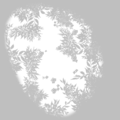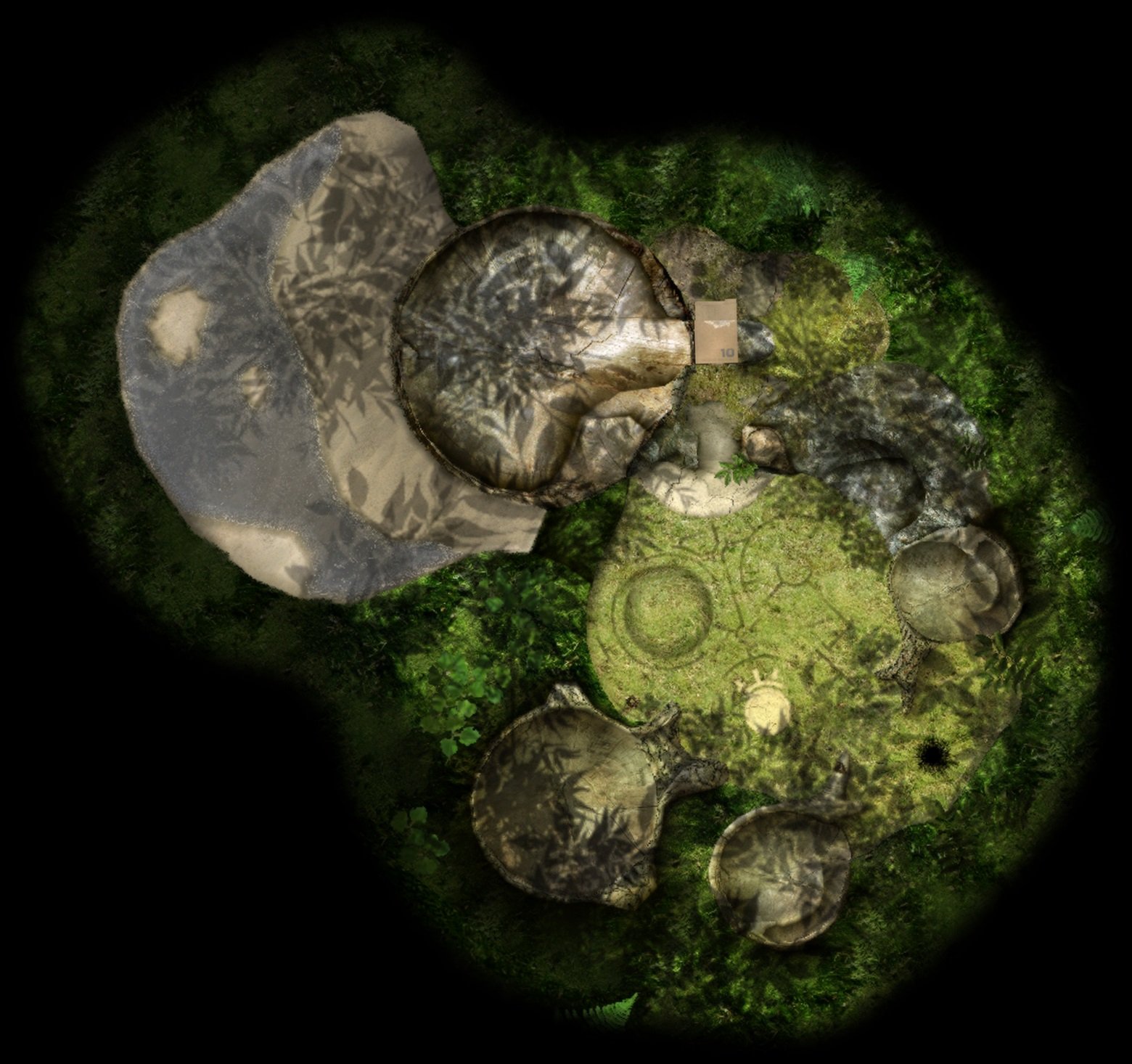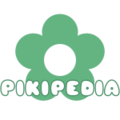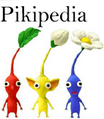Pikipedia:Sandbox
| Welcome to the Pikipedia sandbox! This page allows you to carry out experiments without interfering with any page's content. To edit, click here or the Edit button above, make your changes, and click the Save changes button when finished. Content will not stay permanently; this page is occasionally cleaned. If you need your content to stay, create a subpage to your user page or use the forum.
Please do not place copyrighted, offensive, or libelous content in the sandbox. If you have any questions regarding Pikipedia, please ask at the help desk. Thanks! |
Lighting
Lighting is the arrangement or effect of objects that produce light, in order to depict a lit environment with depth and color. In video games, this specifically refers to any calculated light source that illuminates and shades 3D objects, as well as fog that obscures distant objects. In the Pikmin series, lighting is extremely important to achieving realistic-looking environments and objects, as the designers try to create as much realism in the Pikmin world as possible.
In this article:
- "Light" is any object, seen or unseen, that illuminates an environment.
- "Dynamic" lights are lights that move or cause visible highlights or reflections on objects, while
- "Static" lights are lights that simply add brightness to an area without interacting with other objects.
- "Shading" is the contrast of color on an object because one side of it is illuminated by a light.
- "Shadows" are shapes of low light on a surface, created when an object stands in between light rays and that surface.
- "Materials" are the compositions of objects that interact with light in different ways.
Light sources
Sunlight is the primary source of light in the Pikmin series, and plays an important role in conveying the passage of a day. When a day begins, the color and brightness of a landscape try to suggest morning. As the day progresses, the sun gets brighter and the environment more colorful, until late in the day when it begins setting and colors become more orange as in a sunset. Each game in the series has a unique way of handling sunlight and the shadows it casts, and as the games progress, this arrangement gets closer to simulating real sunlight.
Pikmin
The only dynamic light is sunlight, that shades all objects but does not actually calculate shadows. This light moves throughout the day, beginning foggy and bright in the morning, clear and at average brightness for the majority of the day, and fading to yellow to orange and finally to very little light as sunset approaches (except in The Forest Navel; sunlight is still present there but does not move or change color). All objects in an area have shading based on this light, but none of the scenery casts real moving shadows based on this light. To help players perceive Pikmin locations, up to 50 Pikmin will cast soft shadows that move throughout the day, even when there is no sunlight. In order to optimize processing power, shadows cast by Pikmin are not drawn if more than 51 Pikmin are on the field; instead, they will all have faint shadows directly underneath them. Enemies always have this sort of faint shadow, except for the Beady Long Legs. Environmental objects like plants never move on the map, so one large texture accounts for all their shadows. The exception is Pellet Posies, which cast soft dynamic shadows just like Pikmin.
All other forms of light, such as Common Glowcaps, the light beams coming from the Onions, and even the light around Captain Olimar in The Forest Navel, are static lights. They do not cast any shading or shadows on objects, but simply brighten the area around them to aid visibility or provide light effects, such as the powerful exhaust from the S.S. Dolphin.
A texture for shadows in The Impact Site. The small separated shadows are for the plants in the area.
Pikmin 2
Sunlight in Pikmin 2 behaves very similarly to that in the previous game, except the color of sunlight varies by area, and fog is generally less pronounced. Around noon, the brightness of the sunlight generally increases, and toward the end of the day it dramatically decreases and turns orange. Yet at any point in the day, when a leader approaches an incomplete cave from above ground, the lighting always mixes a very foggy green color to its current color. All objects are shaded by this sunlight, but most of them (including static objects) do not cast accurate shadows. Instead, most moving objects cast circular shadows directly beneath them, and those shadows never move. However, unlike the shadows in Pikmin, these circular shadows can actually dim other objects, and their simple shape allows many shadows to be rendered at once. Several objects have uniquely shaped shadows for specific reasons, such as:
 Boulders, as they fall from the sky and use a growing shadow.
Boulders, as they fall from the sky and use a growing shadow. Segmented Crawbster, for the same reason.
Segmented Crawbster, for the same reason. Empress Bulblax, since it has a long body of circular segments, has multiple circular shadows.
Empress Bulblax, since it has a long body of circular segments, has multiple circular shadows.- Arachnorbs, Snavians, and the Titan Dweevil, since they have extremities that reach beyond their usual shadow.
 Waterwraith, since its rollers appear from the sky before its body.
Waterwraith, since its rollers appear from the sky before its body.
Areas have background shadows that are large textures, just like in the previous game, and these shadows sway but do not effect shading in any way. However, now that plants either cast their own shadows or none at all, background shadows do not have to account for the locations of plants in the area, and can add more interest to the look of the environment.
In caves, light is very limited, and sometimes completely absent beyond a certain distance, due to very dark distance fog. Objects are still shaded by some dynamic light to give them depth, but they are barely or not visible until a leader comes close enough with the static area light around them. This static light's radius, color, and brightness vary by sublevel, depending on what mood is being set. Once the Solar System is obtained, however, caves are always fully illuminated and everything is visible. Some sublevels behave this way anyway, such as metal or outdoor areas where backgrounds are visible, and the final sublevel of the Glutton's Kitchen. The Solar System does not affect the final sublevels of the Cavern of Chaos and the Dream Den.
The Piklopedia in Pikmin 2 is unique in that it simulates a full continuous cycle of lighting including nighttime. During night lighting, ambient light is very dim and darkly blue. Objects still remain shaded and cast simple shadows, but generally colors are darker and duller. Once morning comes around sunlight gradually increases fog color advances from blue to purple back to a faint green, when sunlight finally brings the color balance back to its usual daylight look.
The texture for background shadows in the Valley of Repose. This no longer accounts for the shadows of plants in the area.
Sunlight and fog color change when the active leader is near an incomplete cave.
Pikmin 3
The Wii U can process a great deal more data about lighting 3D objects than the GameCube, and so Pikmin 3 presents a much more accurate representation of physical lighting. All objects in Pikmin 3 cast accurately shaped shadows, including the terrain itself. However, these shadows and lights do not follow the sun depicted in the sky; instead, shadows stay directly under objects for a majority of the day, so that object locations (particularly with airborne objects) can more easily be perceived. A new innovation Pikmin 3 brings is that background shadows, while they are still large textures, actually do affect the shading of other objects, even as they sway throughout the day. This minor detail greatly enhances the realistic look of the environment.
In caves, shadows are also directly under all objects. During rainy days, sunlight is generally darker, and rough surfaces have sharper highlights and smooth surfaces are glossy, to simulate wetness.
Although no other lights in the game than sunlight cast shadows, almost all other light sources are dynamic. Electrodes highlight cave surfaces, leaders' beacons and whistles dimly illuminate a radius around them, and most lighting effects (such as bomb rock explosions) throw accurate light onto other objects. Once again, all these effects give Pikmin 3 a photorealistic edge while still not seriously detracting from gameplay or visibility.
- Blonde Impostor.jpg
An example of how shadows behave in the Twilight River.
Materials
The Pikmin series's in-game objects are made real-world materials, or at least materials similar to those in real life. As such, they try to emulate the interactions with light real-world materials would have. Although these properties are more often faked than accurately calculated, materials allow players a sense of how in-game objects would feel, which gives them more thematic identity. Below is a list of material properties simulated in Pikmin materials, and some prominent examples.
Diffuse reflection
Diffuse surfaces have visibly or even microscopically rough imperfections, so that when light rays hit the surface, it bounce off in many directions instead of one, diffusing the illumination over a large area. Due to the limits of the GameCube's power, most organic objects in Pikmin and Pikmin 2 (such as Pikmin and most enemies) have a smooth, matte-like material that does not reflect light sharply. In Pikmin 3, materials meant to look rubbery, dirty, or skin-like will look diffuse.
- Bigbox.PNG
Cardboard is a notably diffuse substance.
- Five-man Napsack.jpg
Diffuse cloth in Pikmin 2.
A diffuse Armored Cannon Larva and rock in Pikmin 3.
Full area map test
Flowchart styles
| Style 1 | |||||||||||||||
|---|---|---|---|---|---|---|---|---|---|---|---|---|---|---|---|
| |||||||||||||||
| Style 2 | |||||||||||||||
| |||||||||||||||
| Style 3 | |||||||||||||||
| |||||||||||||||
| Style 4 | |||||||||||||||
|
Prima Guide section banners
(Pretend the P is the Prima logo.)
Proposal 1
|
The following information comes from Prima Guides. |
Proposal 2
|
The following information is not found in any canon media, and comes from Prima Guides. |
Proposal 3
|
The following information can only be found in Prima Guides, so it counts as debatable canon. |
Size chart
—
|
100 mm
|
—
|
||
| 200 mm (with stem) | 100 mm |
New cave object layout
Before each list, there'd be a link to an article explaining some details about spawning. These examples are for Dream Den sublevel 3.
Proposal 1
- Treasures
 Glee Spinner × 1
Glee Spinner × 1
- Main objects
 Spotty Bulbear × 1 (falls when Pikmin are nearby)
Spotty Bulbear × 1 (falls when Pikmin are nearby) Dwarf Bulbear × 9
Dwarf Bulbear × 9 Electrical wire × 4 (in cave unit seams)
Electrical wire × 4 (in cave unit seams)- [icon] Gas pipe × 3
 Careening Dirigibug × 2
Careening Dirigibug × 2- And then 11 objects from the following list:
 Bomb-rock – 100% (falls when Pikmin are nearby)
Bomb-rock – 100% (falls when Pikmin are nearby)
- Decorative objects
(Note: In some cases, some of the objects listed above may not appear, as explained here.)
Proposal 2
- Treasures
- Enemies
 Spotty Bulbear × 1
Spotty Bulbear × 1 Dwarf Bulbear × 9
Dwarf Bulbear × 9 Careening Dirigibug × 2
Careening Dirigibug × 2
- Obstacles
 Electrical wire × 4
Electrical wire × 4- [icon] Gas pipe × 3
 Bomb-rock
Bomb-rock
- Decoration
(Note: In some cases, some of the objects listed above may not appear, as explained here.)
Proposal 3
- Treasures
- Enemies
 Spotty Bulbear × 1
Spotty Bulbear × 1 Dwarf Bulbear × 9
Dwarf Bulbear × 9 Careening Dirigibug × 2
Careening Dirigibug × 2
- Obstacles
 Electrical wire × 4
Electrical wire × 4- [icon] Gas pipe × 3
 Bomb-rock × 0 - 11
Bomb-rock × 0 - 11
- Decoration
| Detailed object list (?) | |||||
|---|---|---|---|---|---|
| # | Object | Fixed amount |
Chance of filling the remaining 11 spots |
Spawn method | Spawn location |
| 1 | Carried inside object #2 | ||||
| 2 | 1 | 0% | Falls when Pikmin are nearby | Enemy spots, group B | |
| 3 | 9 | 0% | Normal | Enemy spots, group A | |
| 4 | 4 | 0% | Normal | Cave unit seams | |
| 5 | [icon] Gas pipe | 3 | 0% | Normal | Enemy spots, group B |
| 6 | 1 | 0% | Normal | Enemy spots, group B | |
| 7 | 0 | 100% | Falls when Pikmin are nearby | Enemy spots, group A | |
| 8 | 6 | – | Normal | Plant spots | |
| 9 | 6 | – | Normal | Plant spots | |
(Note: In some cases, some of the objects listed above may not appear, as explained here.)
Proposal 4
- Treasures
- Enemies
 Spotty Bulbear × 1
Spotty Bulbear × 1 Dwarf Bulbear × 9
Dwarf Bulbear × 9 Careening Dirigibug × 2
Careening Dirigibug × 2
- Obstacles
 Electrical wire × 4
Electrical wire × 4- [icon] Gas pipe × 3
 Bomb-rock × 0 - 11
Bomb-rock × 0 - 11
- Decoration
| Detailed object list (?) | |||||
|---|---|---|---|---|---|
| # | Object | Fixed amount |
Spawn method | Spawn location | |
| 1 | Carried inside object #2 | ||||
| 2 | 1 | Falls when Pikmin are nearby | Enemy spots, group B | ||
| 3 | 9 | Normal | Enemy spots, group A | ||
| 4 | 4 | Normal | Cave unit seams | ||
| 5 | [icon] Gas pipe | 3 | Normal | Enemy spots, group B | |
| 6 | 1 | Normal | Enemy spots, group B | ||
| 7 | 0 | Falls when Pikmin are nearby | Enemy spots, group A | ||
| 8 | 6 | Normal | Plant spots | ||
| 9 | 6 | Normal | Plant spots | ||
Then, 11 objects picked from the above with these chances:
| |||||
(Note: In some cases, some of the objects listed above may not appear, as explained here.)
Proposal 5
- Treasures:
 Glee Spinner (carried by the Spotty Bulbear)
Glee Spinner (carried by the Spotty Bulbear)
- Enemies:
 Careening Dirigibug × 2
Careening Dirigibug × 2 Dwarf Bulbear × 9
Dwarf Bulbear × 9 Spotty Bulbear × 1
Spotty Bulbear × 1
- Obstacles:
 Bomb-rock × 11
Bomb-rock × 11 Electrical wire × 4
Electrical wire × 4- [icon] Gas pipe × 3
- Vegetation:
- Others:
- None
| Detailed object list (?) | ||||
|---|---|---|---|---|
| First, the game spawns these objects: | ||||
| # | Object | Amount | Spawn method | Spawn location |
| 1 | 1 | Falls when Pikmin are nearby | Enemy spots, group B | |
| 2 | 9 | Normal | Enemy spots, group A | |
| 3 | 4 | Normal | Cave unit seams | |
| 4 | [icon] Gas pipe | 3 | Normal | Enemy spots, group B |
| 5 | 2 | Normal | Enemy spots, group B | |
| 6 | 0 | Falls when Pikmin are nearby | Enemy spots, group A | |
| 7 | 6 | Normal | Plant spots | |
| 8 | 6 | Normal | Plant spots | |
| 9 | Carried inside entry #1 | |||
| Then, the game spawns 11 more objects, with these chances: | ||||
| # | Object | Chance | Spawn method | Spawn location |
| 7 | 100% | Falls when Pikmin are nearby | Enemy spots, group A | |
(Note: In some cases, some of the objects listed above may not appear, as explained here.)
Notes
Notes
- Pikmin – enemy reel
- “This nocturnal hunter feeds mostly on small animals returning to their nests at night.”
- Pikmin 2 – Olimar's notes – GameCube version
- “This large organism has the familiar mandibles and cranial morphology of the grub-dog family, as well as the characteristic bulging eyes. As with most grub-dogs, the creature's cranium comprises half of its total length and girth. Showing a scarlet abdomen with white spots, this creature is primarily nocturnal, choosing to prey upon smaller creatures returning to their nests. Originally classified as the spotty bulborb, further research has reclassified this species as the red bulborb. Subspecies of varied colors have recently been discovered, but academics are divided into two rival camps over how to handle their classification.”
- Pikmin 2 – Olimar's notes – Wii version
- “This large organism has the familiar mandibles and cranial morphology of the grub-dog family, as well as the characteristic bulging eyes. As with most grub-dogs, the creature's cranium comprises half of its total length and girth. Showing a scarlet abdomen with white spots, this creature is primarily nocturnal, choosing to prey upon smaller creatures returning to their nests. Originally classified as the spotty bulborb, further research has reclassified this species as the red bulborb. Subspecies of varied colors have recently been discovered, but academics are divided into two rival camps over how to handle their classification.”
- Pikmin 2 – Louie's notes – GameCube US version
- “Plump specimens are best spit-roasted whole, stuffed with a lime and a slab of bacon. Baste frequently to ensure a magnificently moist haunch.”
- Pikmin 2 – Louie's notes – GameCube European version
- “Plump specimens are best spit-roasted whole, stuffed with a lime and a slab of bacon. Baste frequently to ensure a magnificently moist haunch.”
- Pikmin 2 – Louie's notes – Wii US version
- “Plump specimens are best spit-roasted whole, stuffed with a lime and a slab of bacon. Baste frequently to ensure a magnificently moist haunch.”
- Pikmin 2 – Louie's notes – Wii European version
- “Plump specimens are best spit-roasted whole, stuffed with a lime and a slab of bacon. Baste frequently to ensure a magnificently moist haunch.”
- Hey! Pikmin – logs
- “The S.S. Dolphin II said it sleeps during the day, but the one I met was awake. I pointed this out and the ship said, "I meant during the day on Hocotate." After defeating it, we found an object rich in Sparklium. It's possible that the creature considers such objects a delicacy.”
- Pikmin 3 Deluxe – Alph's comment
- “Structural flaws: eyestalks, back / Weight: 10 / Only a very confident designer would waive through issues like bright red warning coloration and a tendency to sleep in broad daylight. There's no way a frontal assault on this thing would work, so we have to get creative. I'm thinking we should hit its back hard while it sleeps, or maybe targeting those thin-looking eyestalks.”
- Pikmin 3 Deluxe – Brittany's comment
- “The white polka dots on red is quite a look. Something about it is familiar, but where- Ah. Right. It reminds me of the captain. Not the polka dots- I mean the way it snores as it naps in the sun.”
- Pikmin 3 Deluxe – Charlie's comment – US version
- “This red bruiser gobbles up Pikmin like candy. The standard approach is to attack from behind while it's still asleep. That may seem callous, but it would do the same to you if it could. Stow those feelings and strike!”
- Pikmin 3 Deluxe – Charlie's comment – European version
- “This red bruiser gobbles up Pikmin like candy. The standard approach is to attack from behind while it's still asleep. That may seem callous, but it would do the same to you if it could. Stow those feelings and strike!”
Pikipedia:About rewrite (under construction)
Pikipedia is a wiki all about the Pikmin series. It contains 1,927 articles covering a wide range of topics, including Pikmin types, areas, enemies, and much more. Being a wiki, the site is free to use and edit. Anyone can improve articles with the "edit" button at the top of pages, or by suggesting improvements on talk pages. Other ways to get involved with the wiki include creating or participating in topics at the forum and chatting in the Discord server. Pikipedia is hosted by Porplemontage, and Espyo is the editor-in-chief.
Goal
The goal of Pikipedia is to provide an extensive and detailed encyclopedia on everything related to Pikmin, for new players and veterans alike. Wherever possible, the information covers a wide range of accessibility levels, from the basic outlines of a subject, to the technical aspects of a game's inner workings. The content is aimed at users in all age ranges, all skill levels, and all types – players, editors, content creators, etc.
Given that Pikipedia is community-driven, pleasing the community is also a large part of the overall goals. While the content on the pages aims to be clear, direct, and professional, several backend features provide tools for community members to relax and interact amongst themselves.
History
The Pikmin Wiki was created on December 3rd, 2005 by Dark Lord Revan at Wikia (now called Fandom). It slowly grew over the years, becoming a popular website on the franchise. However, in October of 2010, a major global website layout change was enforced onto all Wikia wikis, and this change was very unpopular. Some wikis moved to independent domains, such as most of NIWA. The Pikmin Wiki followed suit, and became independent at pikminwiki.com on September 14th, 2010, with the new name of Pikipedia. This move occurred through users of Pikcanon-NOT, the fanon wiki now known as Pikmin Fanon, who made an offer to Pikipedia to move to their new domain as well. All the information was moved to Pikipedia, but the old wiki still remained, as it still generated ad revenue for Wikia.
During the period after the split, Pikipedia continued to develop, while the Pikmin Wiki on Wikia became devoid of action and outdated, but still remained on top of most search results. This became a problem for Pikipedia when Pikmin 3 was announced, as the old wiki received most of the attention from the influx of new editors, while earlier editors were mainly still using Pikipedia. (Wikia staff had removed messages saying to use Pikipedia instead of the Pikmin Wiki on Wikia.) By 2012, two barebones wikis existed: Pikipedia, which had quality content and information, but was lacking in Pikmin 3 info due to having so few editors, and the Pikmin Wikia, which had more Pikmin 3 content, but was lacking in quality and accuracy. The different editorial styles of the two wikis contributed to a sense of division between them.
In July of 2014, users of the Pikmin Wiki approached Pikipedia, in an attempt to discuss the future of both wikis. After exchanging ideas, both parties came to the conclusion that it would be in everybody's best interest if the wikis combined at the Pikipedia site, leaving Wikia behind once again. A merging process took place where information on the wikis was combined, and when that was done, Pikipedia was back to being the dominant wiki on the Pikmin franchise. While the old Pikmin Wiki still exists, it is mostly abandoned. It is recommended to ignore it, to stop division in the wikis from happening again.
Since the merge, the wiki has continued to develop. There has been a greater coverage of technical information and topics outside of the main Pikmin games. Information on Hey! Pikmin and Pikmin 3 Deluxe has been successfully documented. The wiki celebrated its tenth anniversary on September 14th, 2020 with a new theme.
Help
Anyone can edit Pikipedia. If you need help with editing, various help pages exist, especially the Helping out page, the introduction to editing a wiki, and the Community Portal. Any questions not answered in the help pages can be asked at the Discord server or Help desk.
Scripts
Besides gadgets and extensions, the wiki currently has two plain Javascript scripts installed:
- Pikan – adds a tool above the textbox when editing a page that analyzes the page's code and reports problems. These range from style issues to policy problems.
- PikipediaUpload – customizes the file upload page to make the upload process friendlier and more prone to follow the wiki's file policies.
NIWA
NIWA, which stands for Nintendo Independent Wiki Alliance, is a family of independent wikis mostly based on Nintendo franchises. It was created with the purpose of providing a union to wikis that chose to abandon their old wiki farms. For a list of wikis that belong to NIWA, see the official website, or consult the template used on the main page.
Logo history
The following is a listing of Pikipedia's logos, sorted by creation date, most current to oldest.























